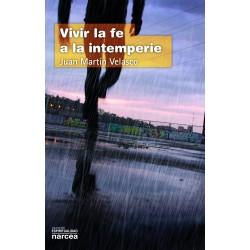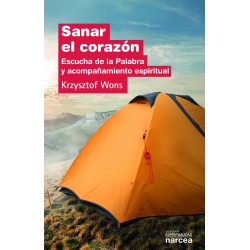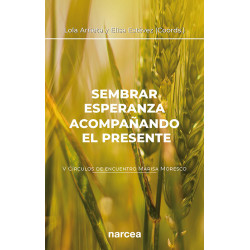Herramientas de accesibilidad
Acompañar en las periferias existenciales (I Círculos de encuentro Marisa Moresco)
Los Círculos de encuentro llevan el nombre de Marisa Moresco como reconocimiento a su aportación como acompañante y testigo, que se plasmó en su decisión determinada y sostenida en el tiempo de generar vida, desde la confianza incondicional en Aquel que es la Vida y con la mediación del acompañamiento.
Los Círculos tienen vocación de encuentro entre distintas personas y colectivos vinculados por el acompañamiento espiritual. Lo nuestro es crear espacios de intersección, construir puentes que vinculen, tejer la diversidad, transitar por lugares conocidos recreándolos y por territorios nuevos que invitan a habitarlos.
Estos primeros Círculos de encuentro se preguntan cómo acompañar la vida en las periferias existenciales, creando espacios seguros en los que la Vida se acoge, se comparte y se despliega a favor de todos, especialmente de los más vulnerables. Quieren ser, también un homenaje a la persona de Marisa Moresco.
Con este volumen se inicia la publicación de las contribuciones de los Círculos de encuentro Marisa Moresco, impulsados por el equipo Ruaj.
- ISBN
- 9788427727205
- Páginas
- 204
- Edición
- 2ª edición
- Fecha de edición
- 2022
- Alto
- 21,00 cm
- Ancho
- 13,50 cm
Introducción
I. TRANSITAR Y DEJARSE MIRARPOR LAS PERIFERIAS. Pedro José Cabrera Cabrera
Transitar (y detenerse)
Periferias (y centro)
Mirar (y ser mirado)
II. ¿QUIÉN PUEDE COMPRENDER MI DOLOR? José Mª Fernández-Martos, SJ
Quien comparece y no pasa de largo
Quien aprende a mirar con mucho miramiento
Quien zarpa lejos del yo y vive ensanchando sus fronteras
III. LAS PERIFERIAS, LUGARES DE CREATIVIDAD. Núria O'Callaghan Suñol, RSCJ
¿Cuál es el lugar de la creatividad en las periferias en clave de acompañamiento?
Conectar, interconectar distintos ámbitos, personas, situaciones
«De lejos toda montaña es azul. De cerca toda persona es humana» (Casaldáliga)
IV. LA CULTURA DEL DESCARTE, ¿QUÉ NUEVAS ÉTICAS? Tusta Aguilar García
Algunos elementos que nos urgen a dar nuevas respuestas éticas
¿Cómo contribuir al cambio de las mentalidades?
Perspectivas filosóficas
V. ENCARGARSE, CARGAR Y HACERSE CARGO DE LAS PERIFERIAS. «SE LE CONMOVIERON LAS ENTRAÑAS». Pepa Torres Pérez, ACJ
¿Cómo mira Dios las periferias? (Ex 3,7-10)
¿Cómo nos mira Dios desde los ojos de quienes habitan las periferias?
A modo de epílogo: «Los pobres son nuestros maestros, los humildes nuestros formadores» (San Gregorio Nacianceno)
VI. ME HAS CONSOLADO Y ME HAS HABLADO AL CORAZÓN (RUT 2,13) ACOMPAÑAR EN LAS PERIFERIAS EXISTENCIALES. Lola Arrieta Olmedo, CCV
Primera parte: Periferias existenciales… ¿Qué pasa y nos pasa si las repensamos juntos? ¿A qué nos mueven?
Segunda parte: Acompañar en las periferias existenciales para subvertir las dinámicas de exclusión
Tercera parte: Testigos… Hay testigos que dicen es por ahí…
Accompanying in the existential peripheries
I Meeting Circles Marisa Moresco
The Meeting Circles receive their denomination from Marisa Moresco in recognition of her contribution as a companion and witness, which was reflected in her determined and permanent decision to generate life, from the unconditional trust in the One who is Life and with the mediation of the accompaniment.
The Circles are destined to become a meeting between different people and groups linked by spiritual accompaniment.
This first volume meets the challenge of how to accompany life in the existential peripheries, creating safe spaces in which Life is welcomed, shared and unfolds for everyone, especially the most vulnerable.
Lola ARRIETA OLMEDO is a spiritual guide and psychotherapist. At present she is fully dedicated to the coordination of the Ruaj team, which was founded in 1997 together with Marisa Moresco and Concha Calleja.
Elisa ESTÉVEZ LÓPEZ has a PhD in Theology and is a permanent teacher in the Department of Sacred Scripture and Church History at Comillas Pontifical University (Madrid). She is a member of the Ruach team.
Introduction
I. Transiting the peripheries and allowing to be looked at by the peripheries. Transiting (and stopping). Peripheries (and center). Look (and be looked at).
II. Who can understand my pain? Who appears and does not pass by. Who learns to look carefully. Who sets sail far from the self and lives widening its borders.
III. The peripheries as places of creativity. What is the place of creativity in the peripheries from the perspective of accompaniment? Connecting and interconnecting different areas, people and situations. “At long range, every mountain is blue. At close range, every person is human» (Casaldáliga).
V. The throwaway culture. What new ethics? Elements that ask us to give new ethical responses. How can we contribute to changing mentalities? Philosophical perspectives.
V. Taking charge and charging with the peripheries. “His heart pounded”. How does God look at the peripheries? How does God look at us from the eyes of those who live on the peripheries? As an epilogue: The poor are our teachers, the humble are our educators” (Saint Gregory Nazianzen).
VI. “You have comforted me and spoken kindly to your servant” (Rt 2:13). Accompany in the existential peripheries. What happens and what happens to us if we rethink them together? What pounds our heart? Witnesses... There are witnesses who say it’s over there.
Lola Arrieta Olmedo
Lola Arrieta Olmedo, acompañante espiritual y psicoterapeuta, en la actualidad dedicada de lleno a la coordinación y tarea del equipo Ruaj, fundado en 1997 junto con Marisa Moresco y Concha Calleja.
Elisa Estévez López
Elisa Estévez López, Doctor in Theology (University of Deusto, Bilbao) and a graduate in Biblical Sciences (Pontifical Biblical Institute of Rome), is a Full Professor in the Department of Sacred Scripture and Church History at the Pontifical University of Comillas (Madrid).

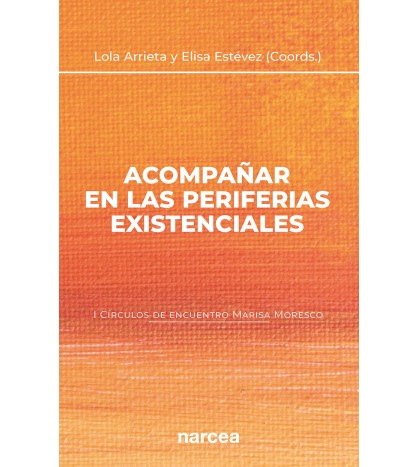


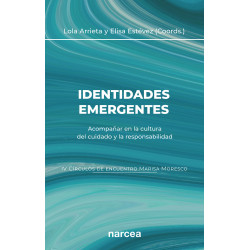
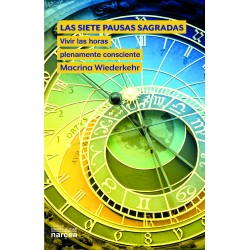
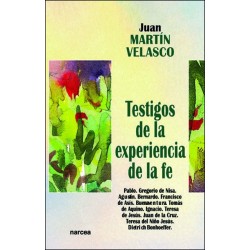
![Acompañar en la [in]certidumbre](https://narceaediciones.es/1703-home_default/acompanar-en-la-in-certidumbre.jpg)
